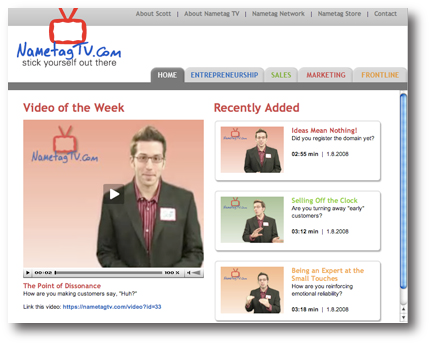 When faced with any task, endeavor or project, two questions need to be asked:
When faced with any task, endeavor or project, two questions need to be asked:
1. What needs to be done intentionally?
2. What do I hope will happen incidentally?
First, let’s explore the word “intentional.”
It comes from the Latin intendere, which means, “To direct one’s attention.”
So, it’s the action you take first, along with the attitude you maintain while taking it.
And, in many cases, that which you intend to do is simple, process-oriented and free from agendas.
For example, let’s say you’re going to exhibit at a trade show.
Your intentions might be to have fun, be uniquely visible, develop and maintain mutually valuable relationships, deliver value and listen to the needs of your attendees.
IN SHORT: Journey, not destination; conversations, not sales pitches.
Now, on the other hand, the word “incidental,” comes from the Latin incidentem, which means, “To occur casually in connection with something else.”
So, it’s the consequence of the intentional stuff.
And, in many cases, that which incidentally occurs is organic, serendipitous and reciprocal.
So, let’s go back to the tradeshow exhibit again.
Considering your intentions from the first example, your incidentals might be obtaining new clients, earning money and building your business.
See the difference?
OK, good. Now, here comes the tricky part…
Because your biggest challenge is going to be discerning between intentionals and incidentals.
BUT HERE’S THE GOOD NEWS: This can be accomplished by asking one simple question:
Is this an intentional action or an incidental consequence?
MY SUGGESTION: Write this question on a sticky note and post it where you can see it every day. This will train your mind to distinguish between intentions and incidentals.
– – –
Now, to further your understanding on the distinction between these two words, let’s take a look at four examples:
1. Don’t (try) to make sales.
Instead, INTENTIONALLY … deliver value first, position yourself as a resource and a trusted advisor, communicate your uniqueness quickly and ask well-timed, creative and thought-provoking questions.
Then, INCIDENTALLY, you will make sales.
2. Don’t (try) to be a leader.
Instead, INTENTIONALLY … be an empathetic, active listener; be inspiring, be passionate, be approachable, be consistent with your character and add value to yourself and to others every single day.
Then, INCIDENTALLY, people will follow you.
3. Don’t (try) to get lots of hits on your website.
Instead, INTENTIONALLY … focus your efforts on creating a web presence through octopus (not earthworm) marketing; blog every single day, make your website easy to find, share and talk about; and build remarkability and word-of-mouth-worthiness into every element of your business.
Then, INCIDENTALLY, the website hits will come pouring in.
4. Don’t try to get the media to approach you.
Instead, INTENTIONALLY … validate your expertise through the publishing of written, audio and video content; post pictures of you doing what you do; take small interviews first, create a media room on your website; and establish a unique, opinionated position, philosophy or approach to doing business.
Then, INCIDENTALLY, the media will come to you.
Ultimately, the distinction between intentional and incidental is best summarized by something I (admittedly) learned from an episode of Dr. Phil.
His advice to the panel of overweight guests was, “Don’t dwell on the idea of shedding pounds, but rather, focus on living a healthier lifestyle.”
He encouraged (er, yelled at) them to modify their eating, drinking, exercising and sleeping habits.
That was the intentional part.
And as a result, he said, they would experience increased energy, higher self-esteem, a more positive self-image and, eventually, a loss of weight.
That was the incidental part.
So, whether you’re trying to increase sales, drive web traffic, lead a group of employees – or even shed those unwanted pounds – here’s the secret:
Fohttp://www.blogger.com/img/gl.link.gifcus on the umbrella.
Ask yourself, “Is this an intentional action or an incidental consequence?”
Because, as my mentor, Arthur Scharff says, “Seeking destroys the journey.”
LET ME ASK YA THIS…
What question do you ask yourself before undertaking any endeavor?
LET ME SUGGEST THIS…
Share your best one here!
* * * *
Scott Ginsberg
That Guy with the Nametag
[email protected]
…only 18 more days until NametagTV.com goes ON AIR!


 (Read part 1 of this post series
(Read part 1 of this post series  Enjoy this post?
Enjoy this post? The only thing cooler than learning is UN-learning.
The only thing cooler than learning is UN-learning. Enjoy this post?
Enjoy this post?